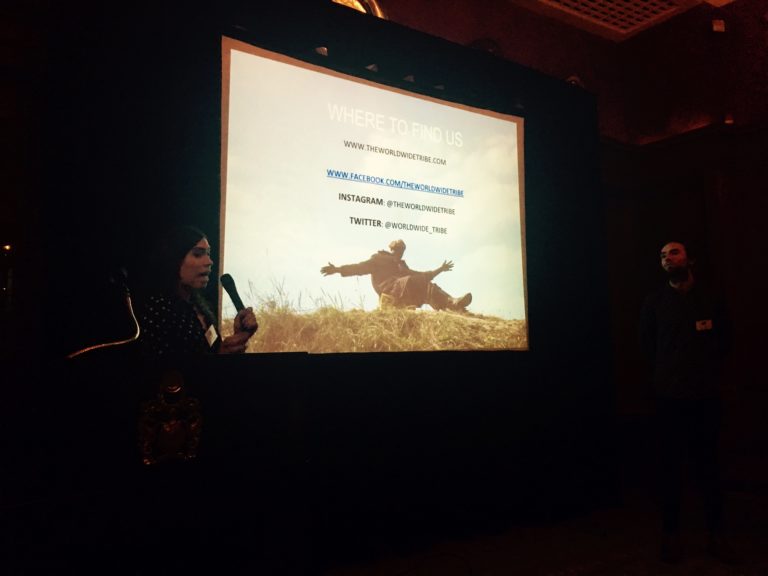Who Are You? The Issue of Identity …

- Chris Skinner, Chairman at The Financial Services Club
- 04.10.2016 09:45 am undisclosed
We had a really interesting meeting about digital identity, blockchain and the Calais Jungle at The Financial Services Club recently from Jaz and Nils O’Hara of the Worldwide Tribe.
One member of the Club, Nick Swanson of ObjectTech, was so taken with it that he blogged about it. Thanks Nick and he’s kindly allowed me to publish his blog here …
THE REFUGEE CRISIS – THOUGHTS ON THE FINANCIAL SERVICES CLUB MEETING
Last week I was privileged to see the presentation from Jaz and Nils at The Worldwide Tribe (theworldwidetribe.com) present to the Financial Services Club.
Their story began when a Facebook post about a visit to the Calais refugee camp – the jungle – was shared 60,000 times overnight. Seeing first hand the power of social media, they appealed for any donations that they could take on a subsequent trip to the camp. They were overwhelmed with donations, and have used the momentum they created to help people in camps across Europe and in Jordan. Go visit their website, read their story and share it.
The topic of the evening was ‘the refugee crisis is an identity crisis’, so it was great to hear from people who know what they are talking about from a non-financial and non-techie perspective. Some issues that came up from their experience are directly of interest to those of us working on self-sovereign identity.
Birth registration Vs. Identity they can use now
Identity is often a nebulous and slippery concept – we all have one, whether we have, or ever had documents to prove it. Registering one’s birth is clearly a different identity problem to satisfying KYC/AML requirements needed to access (for instance) remittance services.
One question which was raised during the Q&A session was what kind of digital identity the refugees would be likely to hold – what would it mean?
Would it be a French one, validated in some way by parts of the French state? That would seem unlikely given the reason people are spending so long in the camp is in part because of the length of time it is taking people to get processed (in fact, one reason they want to get to the UK is in part the fact that it takes less time to get processed in the UK due to lower levels of migration).
Would it be that a ‘Jungle’ ID, validated by some informal body which could be set up by an NGO or volunteer group in the camp? Self-sovereign identity (SSID) – in its inherent flexibility – really seems to have the answer. SSID allows for an appropriate body in these particular circumstances to attest to an individual’s ID.
So rather than a ‘jungle’ ID as such, it is an individual’s personal digital ID. People in the camp can begin to build up meaningful credentials about who they are, where they are, and how they typically behave.
A UK citizen can rely on state and semi-state bodies, as well as banks and utilities to attest to their ID. In a less formal, non-state or failed state context, there are other bodies – schools, aid workers, the UN, charities – who could perform this role. When an ID is in a digital form, reliability can be measured and the seed of an ID established. This can then be hardened over time.
This leads onto my second observation.
Identity from above Vs. Identity from below
Something which was mentioned several times was the scepticism, apprehension and even fear that people in the camp have towards authority – this makes sense when you consider their experience of ‘the state’ to this point. Giving identities to refugees and ‘stateless’ people who have no documentation cannot in any way be akin to being ‘processed’ by Big Brother. Simply being put on a database will make people expect to be treated as they have been treated by governments previously
Again, self-sovereign identity provides part of the solution – an identity which is owned and operated by the individual, and which does not have a centralised database.
Interest from the financial services industry
A final observation is the fact that came from speaking to Nils and Jaz was the notable interest they have had from people in the financial services industry – the event last night being a case in point. This is because the financial services industry spends significant resources dealing with issues of identity, and the expertise and infrastructure which can do most for people in places like the jungle is within the financial sector.
There cannot be one digital identity system for refugees, the world’s poor, and those from failed states, and a separate one for those in functioning, richer states. For an identity system to succeed, be sustainable, and genuinely help wherever one sits on the ‘identity spectrum’, both people in Calais and people in London going to their bank, must be served by the same underlying global approach which gives the individual ownership of their own data, and provides the control necessary to provide a single point of integration.




















